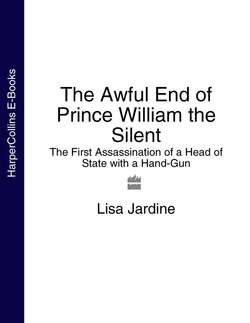Читать книгу The Awful End of Prince William the Silent: The First Assassination of a Head of State with a Hand-Gun - Lisa Jardine - Страница 11
WANTED DEAD OR ALIVE
ОглавлениеA striking feature of William the Silent’s leadership of the Dutch Revolt is the significant part pamphlet publications by both sides played in the unfolding of events. A steady stream of passionate pleas on behalf of each party’s cause issued from European printing houses and circulated throughout Europe. Copies of a number of these survive in three or more languages (generally Dutch, French and English), thereby guaranteeing the broadest possible dissemination of the views expressed.
It is against this background of a propaganda war in which – unlike the war on the ground – the Protestant cause was winning hands down, that in 158o Philip II issued a proclamation inciting all good Catholics and all those loyal to the sovereignty of Spain to seek an occasion to kill William the Silent, and offering the successful assassin a reward of twenty-five thousand gold crowns, together with lands and titles. Like fatwahs before and since, the proclamation, which circulated widely in numerous European languages, was strategically counter-productive. The immediate response was the publication of William’s ‘Apology’ – a compellingly-written treatise in which the political theories of Marnix, Duplessis-Mornay and Languet fleshed out into respectability an open declaration of defiance of Spain and Spanish-imposed rule.
There is no doubt that William the Silent was the winner in this pamphlet war. Indeed, such has been the success of the picture painted by him, speaking in the first person (ghosted, probably, by Marnix, Villiers, Languet and Duplessis-Mornay), or by others speaking on his behalf, that it is hard to remember that at the time of his death William did not appear to all those around him as the irenic, tolerant and eminently reasonable man of the pamphlet characterisations. Nor did the Protestant cause he championed, and in which he remained resolutely supported by Queen Elizabeth I of England and her key ministers, Leicester and Walsingham, look as bright a prospect as it had in the 1570s.
On the contrary, by the time of William’s assassination many of those around him appear to have been ready to settle for peace at any price. For the first time pamphlets began to appear in which even convinced Protestants urged a reconciliation with Philip II. William himself wrote privately to the unwaveringly supportive Walsingham in January 1584 admitting that in spite of his bravado in public, his country was in a dreadful state:
I can assure you that the body of this state is much more gravely sick than appears on the outside, and that the evil has gone so far that the most vital organs have long ceased to function. I ask you to excuse me for so often behaving like the sick, who are ashamed to tell others of their complaints and even try to conceal them as far as they can from their doctors.21
By 1584, not only Philip II, but almost any of the other groups locked in struggle in the Low Countries could have conspired to have William the Silent dead, to end the political deadlock. A proposal to nominate him Count of Holland and Zeeland while Anjou was alive would have made him a barrier between the northern rebels and the new ruler, whom they did not trust to rule them as they wished. Even without that title, William’s position was anomalous, since after Anjou’s nomination as Lord he remained stadholder of the two provinces, but had not actually been appointed (or had his appointment ratified) by Anjou. After Anjou’s death his position continued to be constitutionally awkward. He was recognised and accepted as the States of Holland’s provincial ruler, but without appointment as such, and they continued to grant him political leadership or ‘high authority’. Following the Act of Abjuration, William was designated ‘sovereign and supreme head’ in Philip’s place, but ‘sovereign’ was carefully glossed as ‘having the High Authority and Government’ of the state.22 Like Yassar Arafat, William the Silent – once the beloved figurehead of the revolt or intifada – had become, by his anomalous political position, in the end a liability.
